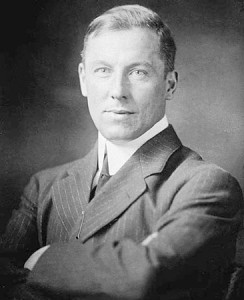 During the early days of the 20th Century Robert William Service brought the harsh life of the Yukon to life with poems such as The Shooting of Dan McGrew. Despite the populist nature of his prose and meaty descriptions of life in the gold rush days, Service was actually a humble bank clerk who had been born in England in 1874 and went to school in Glasgow.
During the early days of the 20th Century Robert William Service brought the harsh life of the Yukon to life with poems such as The Shooting of Dan McGrew. Despite the populist nature of his prose and meaty descriptions of life in the gold rush days, Service was actually a humble bank clerk who had been born in England in 1874 and went to school in Glasgow.
He joined the banking fraternity after leaving school but writing was his first love and his influences were the greats such as Keats and Tennyson. When he went to British Columbia at the age of 21, Service soon discovered his love of the cowboy life and spent the next few years travelling across North America, holding down and loosing various jobs, and falling in love several times.
He continued to write and in 1900 his first poems on the Boer War appeared in the Victoria Daily Colonist. By 1903 he was back in the banking life and living once again in British Columbia. In 1904 he was sent to Whitehorse on Yukon which was the influence for many of his gold rush ballads. Shortly after, Service was asked to write a poem for the Whitehorse Star newspaper from which was spawned The Shooting of Dan McGrew.

This narrative poem did much to set the tone in the eyes of the public of the Yukon and the gold rush towns where rugged prospectors did battle in saloon bars for the love of a woman. It has been read over the years by the likes of President Ronald Raegan, even mentioned on film by actress Marlene Dietrich and is one of the enduring poems of the Wild West era.
After he had collected enough poems, Service put them together as a book and sent them to his father along with a cheque to get copies printed. His intention was to give them out to friends but an enterprising printer and publisher got hold of them and the book soon became a great success. His popularity seemed to snowball from then on and the book, entitled The Song of Sourdough earned him the princely sum of $100,000 in royalties.
In 1908 he released another set of Yukon ballads which were just as successful and shortly after decided to devote himself full time to writing. He used his new found wealth to travel and eventually ended up in Paris where he pretended to be a painter before World War One broke out. He was in his forties at the time and tried to enlist but was refused on the grounds of varicose veins.
Undeterred, he worked as a stretcher bearer and ambulance driver.
In 1916, suffering from bad health and convalescing in hospital, he wrote a series of war poems that were collected in the book Rhymes of a Red Cross Man. Following the end of the war he remained in Paris for a while, reputedly one of the richest writers in the world at that time. Despite that he used to dress as an ordinary worker and mingle with the people, observing and writing. It led to his next work Ballads of a Bohemian published in 1921.
After a period of writing thriller novels, Service returned to America and settled in California during the outbreak of World War Two and even played in some films with stars such as John Wayne and Marlene Dietrich. His later years were prolific, with 6 poetry books produced between 1949 and 1955.
His writing was always considered as populist by the elite who passed judgement on such things and he was often nicknamed the Canadian Kipling. But Service didn’t call his work poetry either, content to cast it as verse that told a story pleasing to the ear as well as the eye.
He died in 1958 and The Ballad of Dan McGrew was read at his funeral along with his other most memorable work The Cremation of Sam McGee.


